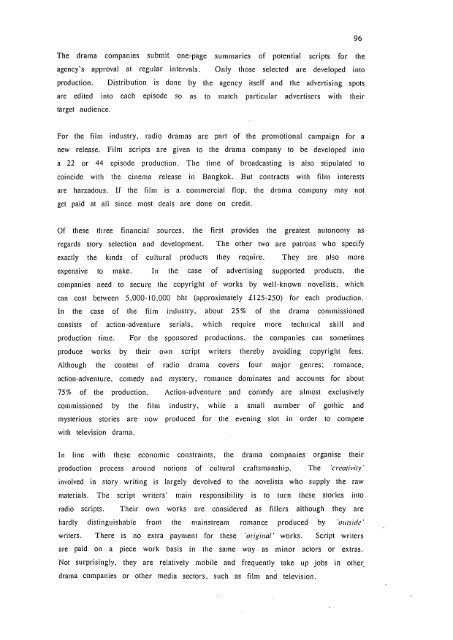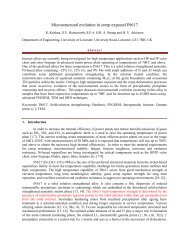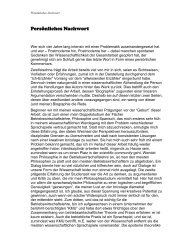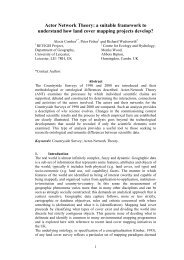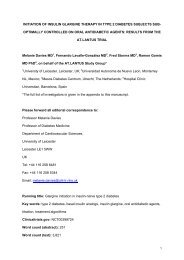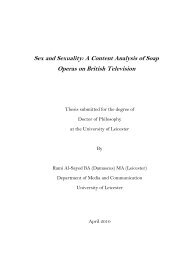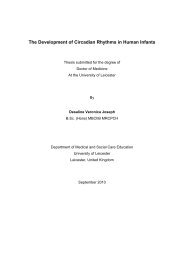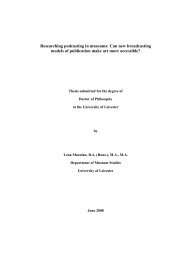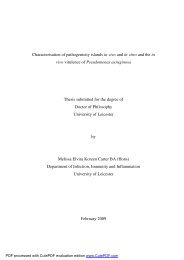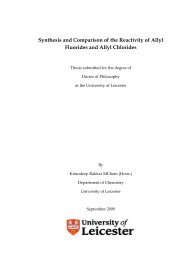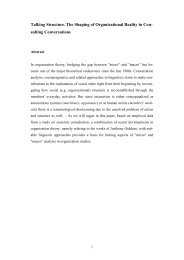iieiiei1eWrkers - Leicester Research Archive - University of Leicester
iieiiei1eWrkers - Leicester Research Archive - University of Leicester
iieiiei1eWrkers - Leicester Research Archive - University of Leicester
Create successful ePaper yourself
Turn your PDF publications into a flip-book with our unique Google optimized e-Paper software.
The drama companies submit one-page summaries <strong>of</strong> potential scripts for the<br />
agency's approval at regular intervals. Only those selected are developed into<br />
production. Distribution is done by the agency itself and the advertising spots<br />
are edited into each episode so as to match particular advertisers with their<br />
target audience.<br />
For the film industry, radio dramas are part <strong>of</strong> the promotional campaign for a<br />
new release. Film scripts are given to the drama company to be developed into<br />
a 22 or 44 episode production. The time <strong>of</strong> broadcasting is also stipulated to<br />
coincide with the cinema release in Bangkok. But contracts with film interests<br />
are harzadous. If the film is a commercial flop, the drama company may not<br />
get paid at all since most deals are done on credit.<br />
Of these three financial sources, the first provides the greatest autonomy as<br />
regards story selection and development. The other two are patrons who specify<br />
exactly the kinds <strong>of</strong> cultural products they require. They are also more<br />
expensive to make. In the case <strong>of</strong> advertising supported products. the<br />
companies need to secure the copyright <strong>of</strong> works by well-known novelists, which<br />
can cost between 5,000-10.000 hht (approximately £l25-250) for each production.<br />
In the case <strong>of</strong> the fIlm industry, about 25% <strong>of</strong> the drama commissioned<br />
consists <strong>of</strong> action-adventure serials, which require more technical skill and<br />
production time. For the sponsored productions. the companies can sometimes<br />
produce works by their own script writers thereby avoiding copyright fees.<br />
Although the content <strong>of</strong> radio drama covers four major genres romance.<br />
action-adventure, comedy and mystery, romance dominates and accounts for about<br />
75% <strong>of</strong> the production. Action-adventure and comedy are almost exclusively<br />
commissioned by the film industry, while a small number <strong>of</strong> gothic and<br />
mysterious stories are now produced for the evening slot in order to compete<br />
with television drama.<br />
In line with these economic constraints, the drama companies organise their<br />
production process around notiolls <strong>of</strong> cultural craftsmanship. The 'creativiiv'<br />
involved in story writing is largely devolved to the novelists who supply the raw<br />
materials. The script writers' main responsibility is to turn these stories into<br />
radio scripts. Their own works are considered as fillers although they are<br />
hardly distinguishable from the mainstream romance produced by 'ouiside'<br />
writers. There is no extra payment for these 'original' works. Script writers<br />
are paid on a piece work basis in the same way as minor actors or extras.<br />
Not surprisingly, they are relatively mobile and frequently take up jobs in othei<br />
drama companies or other niedia sectors, such as film and television.<br />
96


